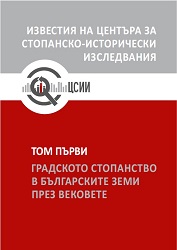Издръжката на българското православно духовенство в Княжество България
Financial support of the Bulgarian Orthodox Clergy in the Principality of Bulgaria
Author(s): Petko St. PetkovSubject(s): History, Economy, National Economy, Economic history, Modern Age
Published by: Център за стопанско-исторически изследвания
Keywords: Bulgarian Orthodox Church; Bulgarian Principality/Kingdom; Orthodox clergy; material maintenance; church legislation
Summary/Abstract: The report examines the legislation basis and the practical realization of material support of the Bulgarian Orthodox clergy. Shown is the initial state of the problem during the years of operation of the Bulgarian Exarchate as a specific Bulgarian proto-state in the Ottoman Empire (1870–1878). It analyzed in detail the question of the maintenance of the clergy after 1879, when is accepted the Tarnovo Constitution, according to which the Orthodox religion was “dominant” in the Principality of Bulgaria. Tracked the difficulties in developing and adopting the relevant texts in the new Exarchate statute partial application and refusal of the government to fulfill some of its obligations – providing supplemental salary of urban and rural priests that happens only during the reign of Stefan Stambolov (1890–1891).The review of the maintenance of the Bulgarian Orthodox clergy over a relatively long period confirms the findings and conclusions on the question of the attitude of the Bulgarian state to supposedly “dominant” Orthodox religion and Bulgarian Orthodox Church. As for the senior clergy in the Principality / Kingdom of Bulgaria, the problems of material sustainability are not as sharp, but generally it is insufficient for normal performance of the bishop's duties. But the unsatisfactory and incomplete resolve the issue of maintenance of the white clergy, and lack of opportunities for higher theological education leads to weak or insufficient motivation to make full and proper performance of his professional duties. Priests are the bridges by which church people (clergy and laity) communicate with each other. They largely not have any theological training nor the material means for a normal existence. So this kind of church activity remained at the level of household ritual common religiosity.
Journal: Известия на Центъра за стопанско-исторически изследвания
- Issue Year: I/2016
- Issue No: 1
- Page Range: 189-221
- Page Count: 33
- Language: Bulgarian

